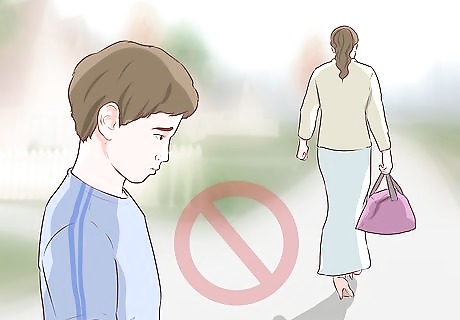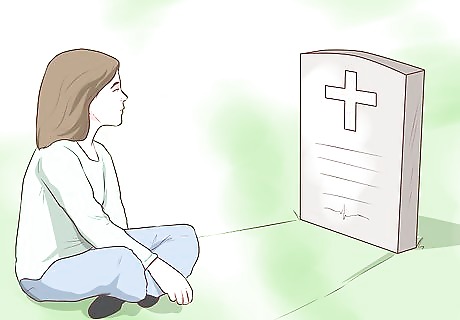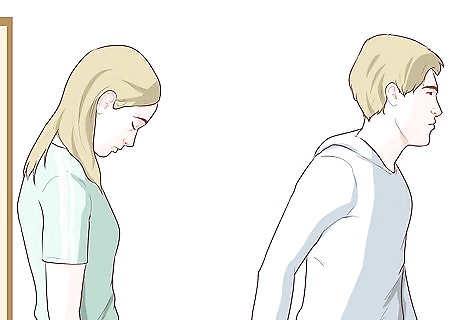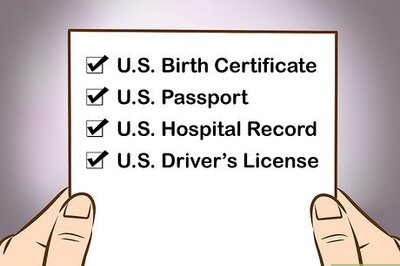
views
Working Through Your Emotions

Accept your emotions as your responsibility. Recovering from a fear of abandonment requires finding healthy ways to cope with your anxieties. The first step towards finding healthy coping mechanisms is to take responsibility for the way you feel. Even though your emotions might be triggered by other people’s actions, realize that the way you respond to them is up to you. For example, if someone insults you and it makes you mad, you have to recognize that, even if the remark was degrading or humiliating, you have a choice about how to react. You can get angry, cry, or storm off. Or, you can search inside yourself and remember that your well-being is not dependent on the opinions of others, then smile and walk away.

Identify your fear. Pay attention to the feelings, thoughts, and sensations that come up when you think about being abandoned. Which particular scenario are you afraid of? If you were abandoned today, what specific emotion would that generate in you? What kind of thoughts would go through your mind? Getting specific about your fear can help you find ways to combat it. A fear of abandonment often is rooted in the fact that you might feel like you're not good enough to be loved in a relationship. Identifying and challenging those thoughts is important to overcoming that fear. For example, you might fear that if your partner left you, you would feel unlovable and would never be able to find another relationship.

Stop generalizing. If your fear of abandonment comes from an experience you had in childhood, you may be unconsciously assuming that scenario will play out again. Consider themes from your childhood that may be affecting you today. For instance, if you were abandoned by your mother or another female caretaker, you might feel like you can’t trust any women to remain in your life. Remind yourself that this is not a rational assumption to make, and that all people behave differently.

Practice fact checking. When your anxieties are running high, fact checking is a useful strategy for regaining control of them. Take a moment to distance yourself from your emotions and question whether your thoughts make objective sense. Consider whether there is a simpler and more straightforward explanation for what’s going on. For instance, if your partner hasn’t texted you back in half an hour, your first reaction might be to think, “He’s getting tired of me and doesn’t want to talk to me anymore.” When this happens, ask yourself if that’s really the scenario that makes the most sense. It may be more likely that he’s busy talking to someone else or forgot to turn his phone’s ringer on after a meeting.

Adopt a mindful approach. Mindfulness teaches you to focus on what’s going on in the present instead of what might happen in the future. Pay attention to what you’re feeling in the moment and, instead of immediately acting on it or judging yourself for it, ask yourself why you’re feeling that way. This can help you understand your emotions better and know which ones to pay attention to and which ones to let go. Meditation is a good way to get into the habit of mindfulness. Even as little as five or ten minutes of meditation a day can be helpful in becoming more mindful or your thoughts and emotions. Try downloading an app on your phone or watching a guided meditation video on YouTube to get started.
Adjusting Your Behaviors

Identify any behaviors that push others away. If you’re afraid of being abandoned, you might frequently act from a place of insecurity. Calling and texting someone multiple times a day, asking someone to spend all their free time with you, and accusing others of planning to leave you are a few examples of insecure behavior. Unfortunately, acting like this can have the unintended consequence of scaring friends and partners away. If these behaviors sound like you, work on finding alternative ways to manage your anxiety. Practicing mindfulness can help you stop pushing others away. With a mindful perspective, you can examine your motives and choose to avoid impulsive, needy behavior. When you feel insecure, instead of acting on the emotion, try writing in a journal about why you feel that way. Another good option is to take a walk and think through your feelings. When you reach out to other people, start by asking, "Is this a good time to talk?" That way, if it's not, they can just be honest, and you won't be left guessing whether they're distracted or they just don't want to talk to you.

Question the types of relationships you seek. Many people who are afraid of being abandoned habitually seek out relationships with emotionally unavailable people. If you have a history of abandonment, you may unconsciously select partners who will act in the same way as your parents or previous partners. Consider whether seeking out more emotionally available partners would help you break the cycle of anxiety and abandonment. If you notice unhealthy patterns in your relationships, it may be helpful to see a therapist. A mental health professional can help you identify the source of these unhealthy patterns and teach you to develop skills that move you towards healthier, balanced relationships.

Build a network of friends. If you’re afraid of abandonment, you might have the tendency to focus intensely on one relationship to the exclusion of others. Forming a strong network of friends can help you stop focusing on just one person and provide you a sense of security. If one person decides to leave or is unavailable, you will still have other friends to fall back on. Cultivating friendships can also help you practice maintaining healthy relationships. Build a strong support system by opening yourself up to the opportunity to find and make friends. Join a new club at school. Take a cooking class. Visit your local park more often. Or, start a volunteer service commitment to connect with people with the same interests as you.

Focus on activities that build your self-esteem. Improving your self-esteem can help you become more emotionally self-sufficient and recover from your fear of abandonment. When you feel good about yourself and your abilities, you won’t need to rely on others for validation or attention. To increase your self-esteem, try learning a new skill, volunteering to help others, or working on a personal project that’s important to you.
Identifying the Causes

Reflect on how abandonment impacts you. Experiencing the loss of someone close, or past experiences with neglect and physical, mental, or sexual abuse can be a very traumatic. A person who has experienced any of this is more likely to encounter behavioral and psychological challenges because there is that underlying fear that these events could occur again in their current relationships. Some common emotional and behavioral reactions of fear of abandonment include: mood swings and fits of anger, as well as other behaviors that may alienate you from those you hold close. Other symptoms may include poor self-esteem, low self-worth, severe anxiety or panic attacks, feelings of helplessness and hopelessness, and difficulty adapting to change. Fear of abandonment can also impair the ability to trust others and experience. It may lead to co-dependence and associating with people who reinforce those negative thoughts.

Ask yourself whether you experienced abandonment in childhood. Much of the time, fear of abandonment has its roots in a childhood trauma. If you lost a parent or caretaker to death, divorce, or another cause, you might unconsciously fear the same scenario playing out again with other people. You might also have had experiences that made you feel like you weren't equal to your peers when you were a child.

Think about whether you have felt abandoned by a partner. Sometimes, trauma experienced in adulthood can also make you afraid of being abandoned. Ask yourself whether you have lost a partner or someone else close to you through death, divorce, or financial abandonment. These situations can create a general fear of abandonment in some people.

Evaluate your self-esteem. Many people who are afraid of others leaving them suffer from low self-esteem. If you frequently seek validation from other people or attempt to derive your self-worth from your relationships, you might be afraid that others will abandon you and cut off the source of your positive feelings about yourself.

Ask yourself whether you tend to feel anxious. People who are predisposed to anxiety are more likely to fear being abandoned. Many anxious people have vivid imaginations. If you have imagined what it would be like to be abandoned, you might become afraid of it happening, even if it has never actually happened to you before. People with anxiety tend to expect the worst in a situation. For example, you might get anxious (e.g. your heartbeats fast and your palm sweats) when your partner does not immediately answer a phone call. You might worry that there has been an accident, or that the person is purposely avoiding you. In order to overcome anxiety, you must learn to challenge how realistic your thoughts are. Do you have reason to suspect your partner has been in an accident? Is there evidence to show he or she is ignoring you? To combat anxiety most effectively, it may be helpful to see a mental health therapist who has experience treating this condition.

Seek professional help. Depending on the severity of your fear and how this is currently impacting your life, it may be beneficial to seek guidance and support from a qualified therapist or counselor. Look for someone who is certified in treating people with fear of abandonment, as they may be able to help you learn to separate fears of the past from what is actually happening in the present. As you learn to separate the past from the present, and recognize that your fears are not realistic expectations in your current life, you can begin to develop healthier coping skills to any emotional responses you may have in your daily life.
















Comments
0 comment